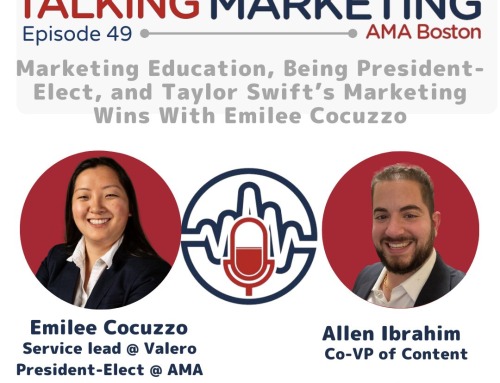Author: Robin Samora, Marketing and PR Consultant
Many small businesses face the same dilemma: You need effective marketing to grow your business, but don’t have the budget to pay for it.
Luckily, there are many cost-effective small business marketing strategies that involve little to no cost, just a bit of sweat equity. Low-cost marketing strategies can be effective, help you build visibility, and deliver a high ROI (return on investment).
So what are the best ways for Boston business owners to maximize marketing, without a million-dollar budget? Keep reading to create a plan that fits a modest budget.
Small Business Marketing on a Budget: A Step-by-Step Plan
Want to create a marketing plan that’s well thought out and works? Be sure to follow these steps:
- Determine a budget for exactly how much you can spend on marketing.
- Create a marketing plan with strategies and tactics that fit within your budget (more on this in the next section).
- Calculate the expected projections and return on investment.
- Set a timeline for your marketing plan.
- Execute on the plan created.
- Track your results and make adjustments to your plan as needed.
10 Low-Cost Marketing Tips for Boston Small Businesses
Here are ten great marketing strategies for Boston small businesses that, when done correctly, don’t break the bank and can improve your bottom line.
1. Optimize Your Google Business Profile
Whether you are a service area business or have a brick-and-mortar location, Google Business Profile is an effective marketing strategy that Boston businesses should take advantage of. Make sure your profile is filled out completely and add photos, videos, and reviews. Sharing posts regularly (news, blogs, FAQs, and company updates) can help with your SEO.
Pro Tip: Post a minimum of at least once a week and keep your NAP (name, address, and phone) consistent across the web. Make it easy for customers to give you a 5-star rating by providing a customized link. Thank every person who reviews you – whether the rating is positive or negative. It shows that you’re paying attention and that you care.
2. Build Partnerships with Other Boston-Area Businesses
Small business owners should focus on local long-term partnerships as a cost-effective way to increase visibility and expand your customer base. When you cross-promote with another business, there’s potential to connect with a new audience and extend your reach online. The right partner will align with your values and goals.
Pro Tip: Connect with a minimum of three strategic partners a month. Brainstorm ways together to build business where it’s a win-win for all parties. Partners should share the same audience and not be competitive. The goal is to work together to build synergy, almost like unofficial business partners.
3. Launch a Referral Program
Referral programs provide an excellent opportunity to improve sales and marketing efforts on a low budget. It’s a great strategy to increase word-of-mouth advertising with your target audience, partners, even your vendors – and keep them coming back for more. Think about creating a user-friendly landing page or brochure that captures the benefits of your referral program and provides an incentive to participate.
Pro Tip: Create at least one new referral partner a month – and reciprocate by being an earnest referral partner. Set up quarterly meetings to learn more about the benefits of working together and finding ideal clients for each other.
4. Collaborate with Boston-based Nano-influencers
Celebrity influencers are costly, especially when you have a tight marketing budget! Working with nano-influencers (influencers with a smaller, loyal following) can be just as effective, particularly if you’re targeting a local audience. While nano influencers’ may reach a growing community, they’re generally seen as more relatable, authentic, trustworthy, and tend to have more engaged audiences than established influencers. Plus, Boston-based nano influencers are more likely to have an audience local to the Boston area. Who in your industry would you consider to be a nano-influencer that could benefit from your business – or how you could help each other?
Pro Tip: Follow, connect, and engage with two nano-influencers a month. You’ll find them in your community, on LinkedIn, or as industry connections. They may even be part of a niche networking group. Get to know them, build a relationship, and never ever sell!
5. Optimize Your Website for SEO
The vast majority of Google users never click past the first page. SEO (search engine optimization) helps your website rank higher in searches on Google, Microsoft Bing, Yahoo, and other search engines – including YouTube, the world’s second largest search engine. Strong, well-crafted SEO will improve your website visibility and can drastically increase the amount of visitors heading to your website. There are many free SEO resources available to help you optimize your site for what your audience is searching for. If you want to DIY, there’s a ton of free SEO training, too. Check out Semrush, Yoast, and research best practices on Moz for starters.
Pro Tip: Find keyword phrases that your company or brand rank for and spend at least an hour a week updating your owned media channels (website, blogs, social media profiles, etc). Make this a regular practice and track your results and your competitors. You’ll be surprised at how quickly you learn!
6. Leverage Local Boston PR
Getting featured in local Boston media outlets can be an excellent way to promote your business locally and increase positive public relations. There are many PR ideas that small businesses can use to reach out to local news outlets and press with an interesting story, fact, opinion, or event. Media outlets are always looking for new, engaging stories that are worth covering. Learn how to write a compelling PR pitch that matches your expertise – and provides value to the audience you’re pitching. It’s not what you want to pitch, it’s how you’ll help their audience and deliver value.
Pro Tip: Do your homework to make sure you know the audience and have read recent content before you pitch. Research the reporter’s background, published stories, style, and social media. (You’ll learn a lot!) Don’t pitch a story idea that’s just been featured. It makes you look like an amateur and who wants that? Pitch twice a month to build your pitch muscle and keep accurate records to track your success.
7. Contribute to Local Social Media Groups (or Start Your Own)
Want to connect with your target audience quickly and from anywhere? Join social media groups that are industry-specific, have members with interests similar to yours, or target a Boston area audience. To find these groups, search for particular hashtags, pay attention to influencers and the media who are active in your niche, or do a simple Google search.
Pro tip: Members will often ask questions or publish “ISO” (In Search Of) posts to get opinions and answers from other group members, so conversations can be telling. This is an effective word-of-mouth strategy that businesses should monitor and – when appropriate – respond to. Research local social media groups twice monthly, and pop in to see if it’s a right fit for you. The never sell rule again applies.
8. Create a Loyalty Program
You can build a connection with your most loyal customers by offering them deals and discounts through a loyalty program. With this cost-effective strategy, you can boost engagement and brand affinity. The result can be a boost in repeat sales and lifetime customers (and revenue). Satisfied consumers turn into loyal brand ambassadors for your company and will sing your praises – and keep buying, as long as you deliver exceptional products and services, and show that you value their business.
Pro Tip: Stay in touch with your customer base with email, social media, and create a reason for them to follow you. Then surprise and delight. Make it a regular habit to keep their business and earn their trust. Stay in touch a minimum of every quarter with a special incentive, and show your thanks in every email or communication.
9. Offer a Free Product or Service for New Customers
Promote a free product or service is an under-looked, but powerful strategy for small businesses to gain visibility and build customer loyalty. It’s up to you to determine the product or service that will be most effective (and cost-effective). Look in your digital library. You probably have something that needs a simple update or maybe forgot you had. Repurposing allows you to re-examine your content and offerings, and make changes that are more in line with who you are now, and what you’re selling.
Pro Tip: Keep a digital folder with all of your content, product ideas, and service descriptions. You could create a PDF from newsletters, notes from recent speaking engagements, and FAQs you’ve collected over the years. On a weekly basis, update the folder so that it’s accessible to your team. When the need arises, they’ll know where to go.
10. Host (or Co-Host) a Local Event
Hosting your own event is an excellent way to reach your local target audience and community. And it can be as simple or as complicated as you like. Promote your event on social media, your website, email, flyers, and share with networking groups. Use Canva for eye-catching, user-friendly design templates. For additional cost savings, co-sponsor with another local non-competitive, aligning brand. It’s an opportunity for both organizations to expand their reach, build a new audience, and build the buzz on social media.
Pro Tip: This is a great time to contact local Boston press to see if they’re interested in your story and possibly attending. For every event that’s noteworthy, write a media release a minimum of 6- 8 weeks prior, shoot video teasers, and share social media copy with partners, friends, colleagues, and others in your circle. Take photos before, during, and after to document the story, and create hashtags specific to the event. And make sure to thank everyone who attended and made it possible. Use this as a template for future events, and note what went well and what could be improved.
What are the Best Cost-Effective Strategies for Your Business?
Some of these small business marketing strategies may work better than others depending on the type of your business, budget, clientele – even the time of year.
And while many of the strategies listed are free, they can take time and effort to execute. It’s all about finding what works best for your business and then implementing them. Create, track, and measure success. That’s what marketing is all about.
Have more questions about the best cost-effective marketing strategies for your small business? Reach out to Robin Samora, a Boston-based marketing and PR consultant that works with small businesses to rev up their brand to attract new clients, connect with customers, get media exposure, and fine-tune strategies to increase sales, without a million-dollar budget.







